Boiled eggs are a healthy, affordable, and convenient choice for a quick snack or addition to a meal. They are high in quality protein, vitamins, and minerals. These important nutrients can help maintain immune and brain health and support muscle and healthy aging.
Table of Contents
Benefits of Boiled Eggs: A Quick Look

- Hard-boiled eggs contain protein, cholesterol and fats, vitamins A and D, choline, lutein, and zeaxanthin.
- These nutrients help with maintaining healthy eyes, brain, immune system, hair, bones, and muscles.
- Eggs are a low-cost, easily accessible, and versatile food.
- Eating boiled eggs can support healthy weight loss and aging.
Nutrition Profile of Eggs
Boiled eggs are rich in vital macronutrients and micronutrients.
| 1 Whole Boiled Egg (50 g) | |
|---|---|
| Energy (calories) | 72 |
| Protein (grams (g)) | 6 |
| Total Fat (g) | 5 |
| Calcium (milligrams (mg)) | 24 |
| Iron (mg) | 0.84 |
| Zinc (mg) | 0.62 |
| Riboflavin (mg) | 0.20 |
| Folate (micrograms (µg)) | 26.5 |
| Choline (mg) | 134 |
| Vitamin B12 (µg) | 0.41 |
| Vitamin A (µg) | 90 |
| Lutein + Zeaxanthin (µg) | 252 |
| Vitamin E (mg) | 0.53 |
| Vitamin D (µg) | 1.25 |
| Saturated Fat (g) | 1.6 |
| Monounsaturated Fats (g) | 1.82 |
| Polyunsaturated Fats (g) | 0.91 |
| Cholesterol (mg) | 206 |
*Nutrition information is from the U.S. Department of Agriculture (USDA) FoodData Central for 1 average-sized (50 g) boiled egg, either hard or soft-boiled, where the white and the yolk are eaten.
Cholesterol and Fat
- 1 boiled egg contains about:
- 206 mg of cholesterol
- 1.6 g of saturated fats
- 0.91 g of polyunsaturated fats
- 1.82 g of monounsaturated fats
- Fat and cholesterol are only in the egg yolk.
Our body produces cholesterol on its own, but it is also found in animal proteins and highly processed fatty foods. Cholesterol is important for building cells, but too much in our blood vessels can lead to:
- Chest pain
- Heart attack
- Stroke
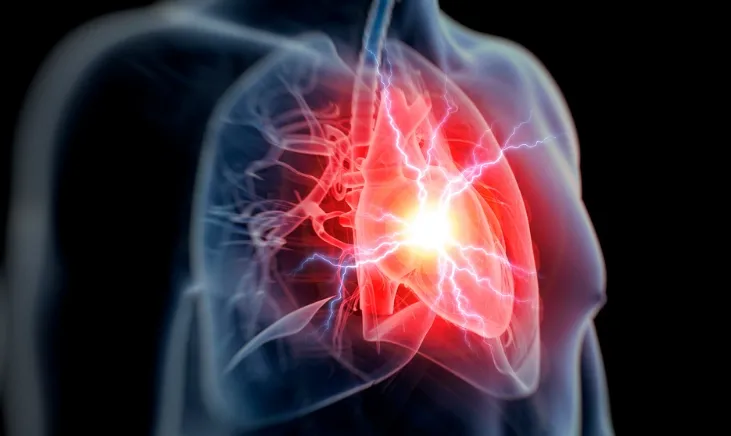
Eggs are one of the highest contributors of dietary cholesterol. While this fact previously led to the recommendation to decrease egg consumption for your heart health, eating eggs has not been associated with a risk of cardiovascular disease.
Research has shown that eliminating foods that contain dietary cholesterol is not necessary and that the focus should instead be on recommending and following healthy dietary patterns that are high in fruits and vegetables, whole grains, and lean proteins.
Calories
- 1 boiled egg contains about 72 kcal.
Boiled eggs provide a moderate amount of energy relative to its nutrient density. The calories in a hard-boiled egg come from the protein and the fat; there are no carbohydrates in eggs.
High Quality Protein
- 1 boiled egg contains about 6.2 g of protein.
Proteins are evaluated based on their amino acid content and how well humans digest them. Protein is found in the egg yolk (~40%) and the egg white (~60%).

Protein foods from animals are usually digested better than those from plants. Eggs from chickens are considered the most digestible protein source.
Eggs also contain all of the essential amino acids. These are amino acids that we cannot make on our own and therefore need to get from our food.
Lutein and Zeaxanthin

- 1 boiled egg contains about 252 µg of lutein and zeaxanthin.
- Lutein and zeaxanthin are only in the egg yolk.
Lutein and zeaxanthin are carotenoids found in the eye lens. They are biologically active compounds that protect the eye from damage. They also give the egg yolk its orange/yellow color.
Choline
- 1 boiled egg contains about 134 mg of choline.
Choline is an essential nutrient important for proper metabolic function and the nervous system. Many people do not get enough choline in their diet. Dietary intake is especially important for pregnant women to ensure that the baby’s nervous system develops properly.
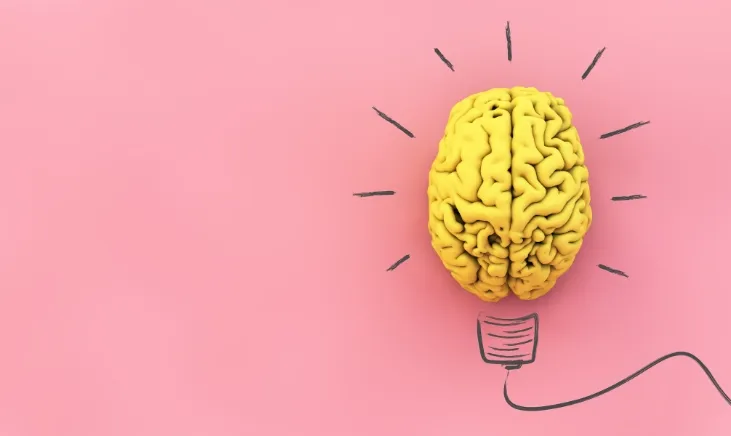
Vitamin D
- 1 boiled egg contains about 1.25 µg of vitamin D.
- Vitamin D is only in the yolk.
Vitamin D is an important nutrient for bone health. Eggs are one of the only foods that naturally contain vitamin D; most other food sources are fortified.

We also make vitamin D through our skin using the sun. However, this is not always possible for those living in northern locations or during the winter months. So, it’s important to consume foods rich in vitamin D or talk to your healthcare provider about taking a supplement.
Changes Based on the Cooking Method
Some nutrients can be lost during the cooking process. Fat-soluble nutrients, like carotenoids, are affected by heat, light, and oxygen but the difference between raw eggs, boiling, poaching, or scrambling eggs isn’t major.
However, fried eggs or scrambling an egg using cooking spray, oil, or butter will increase the fat content compared to eating a boiled egg.
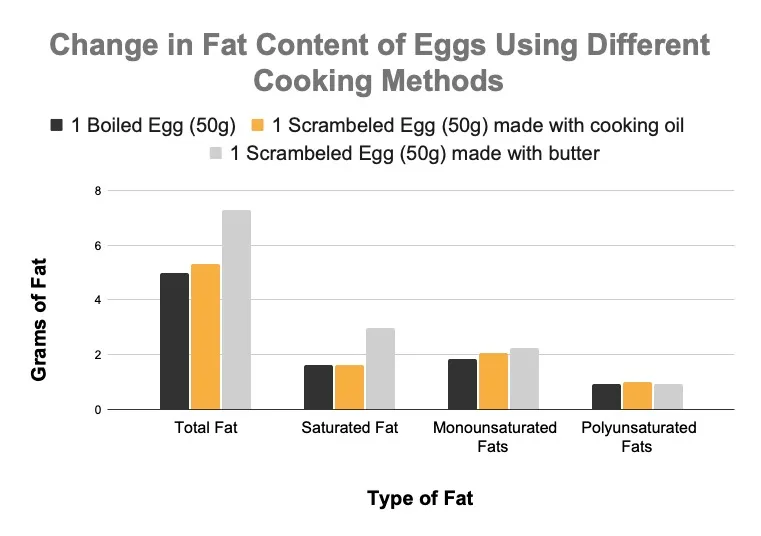
Key Takeaways:
- Eating eggs has not been associated with a risk of cardiovascular disease.
- Egg protein is high quality and easily digested.
- Lutein and zeaxanthin are in the yolk and benefit eyesight.
- Choline helps with metabolism and neural development.
- Eggs are one of the only natural food sources of vitamin D.
12 Reasons to Eat a Hard Boiled Egg
For Good Eyesight

Carotenoids are important nutrients for your eye health. The carotenoids lutein and zeaxanthin have roles in protecting the retina, preventing macular degeneration, and improving visual acuity. They are highly available in egg yolks, but the amount can vary based on the hen’s diet.
Low levels of lutein and zeaxanthin can cause age-related macular degeneration, leading to blindness.
Supports the Immune System

Eggs contain various vitamins and minerals, specifically B vitamins, which are important for maintaining a healthy immune system.
There are also antimicrobial compounds in the egg white, and evidence suggests that they may help prevent and treat various diseases.
The carotenoids lutein and zeaxanthin may also play a role in protecting against oxidative stress by enhancing antioxidant defenses which can decrease the risk of developing some chronic diseases.
Maintains Brain Health
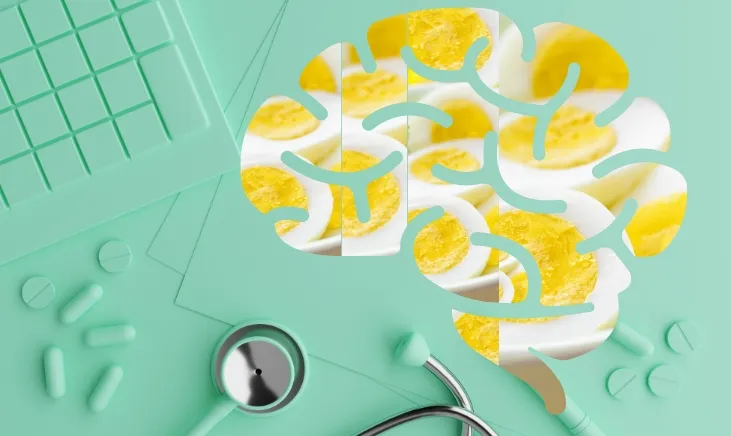
The healthy fats, such as omega-3 fatty acids, found in the yolk of boiled eggs are key factors in keeping the brain healthy.
Lutein and zeaxanthin may also play a role in protecting against neurodegenerative disorders. They have been associated with decreasing oxidative stress which can prevent neuronal damage which leads to neural degenerative diseases.
Supports Bone Health
Vitamin D and calcium are essential nutrients that work together to maintain strong bones and to grow or repair bones throughout life. Hard-boiled eggs naturally contain vitamin D and calcium.
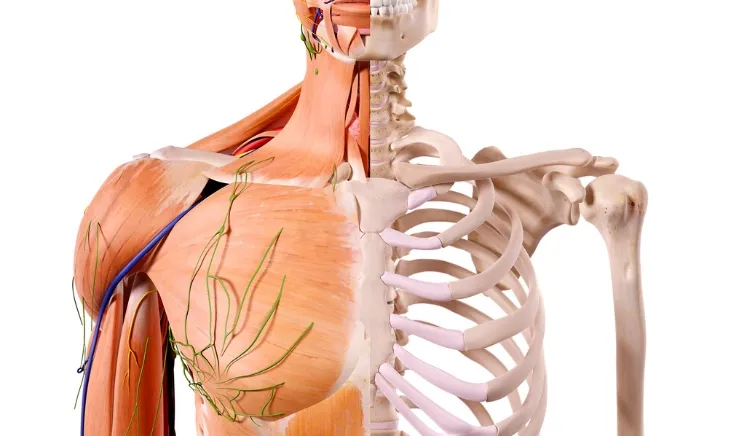
Promotes Muscle Growth
Maintaining muscle mass is important for overall health. To build muscle, our bodies require resistance training and available proteins and amino acids. The protein in eggs contains all of the essential amino acids that are necessary to build muscles.
Losing Weight
Realistic and sustainable methods of weight loss typically include structured meals and snacks that include whole foods high in protein and fiber. This is because lean protein and fiber help you to feel full which can reduce hunger and decrease the urge to overeat or choose foods high in added sugar and fats.
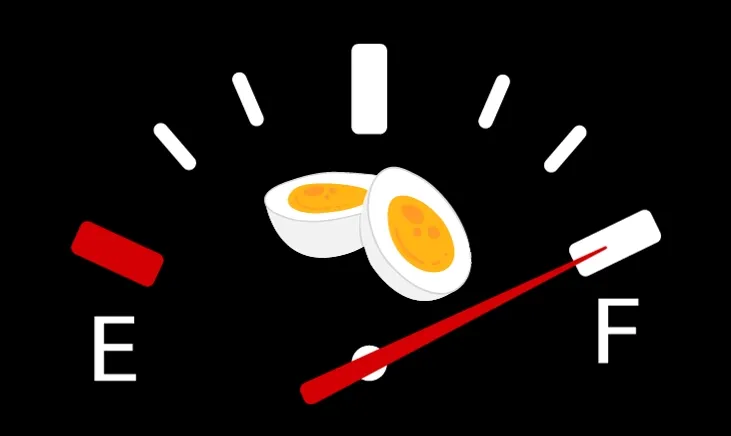
Eggs are a quick and easy source of protein that can be eaten as snacks or meals to promote satiety and help you to stay on track with your weight goals.
The protein in eggs is also important for maintaining lean body mass as you lose weight. Preserving and building muscle mass throughout weight loss is vital, so eating hard-boiled eggs may help you lose weight safely.
Good for the Skin and Hair

Hair and skin are impacted greatly by our nutrition choices. If you are lacking in macronutrients or micronutrients this will be reflected in your hair, skin, and nails.
Some of these nutrients which are found in eggs include protein, vitamins A and D, and the B vitamins.
Low Price
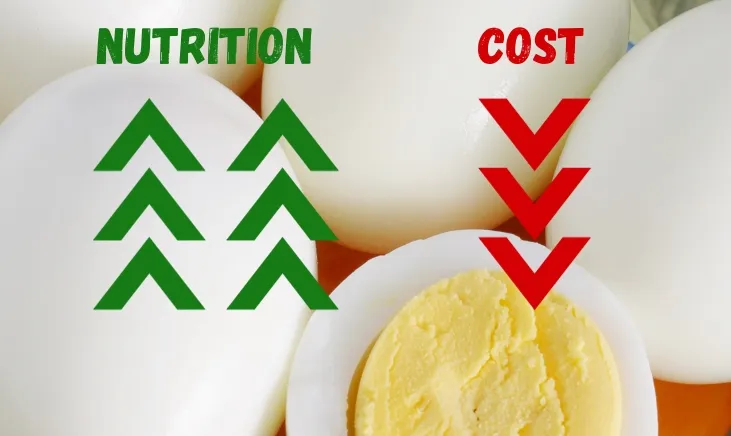
A study using the nutrient-rich food index and food price data sets from the United States summarized the nutritional value compared to the cost of eggs. Among other foods, eggs are the lowest cost source of high quality protein, vitamin A, vitamin B12, calcium, iron, zinc, and riboflavin.
In the United States, food-at-home prices increased 11.4% in 2022. Choosing more cost effective but nutrient-dense foods is good for your wallet and body!
Accessibility
Eggs are eaten all over the world. They are found in almost all grocery stores in North America, and you can even buy them at some convenience stores! Not all fresh produce or protein options are as reliably accessible as eggs.
Ease of Cooking Hard Boiled Eggs

We don’t all have five-star chef cooking skills, but that doesn’t mean that we can’t cook delicious meals at home. You don’t need fancy appliances or hours to dedicate to cooking to make a delicious egg.
Cooking the perfect hardboiled egg only takes 10-12 minutes. Try boiling eggs in larger batches and then keep them in the fridge for busy mornings or a quick snack.
Supports Healthy Aging
As we age, muscle loss is typical, which can lead to decreased quality of life and increased risk of falls. To avoid this, it is important to maintain strong muscles and bones.
Regular resistance activities and eating foods high in protein and calcium can help to slow this muscle loss and maintain bone health. Since eggs are a source of protein and calcium and are easy to chew and cook, they are a wonderful addition to your diet at any stage of life.
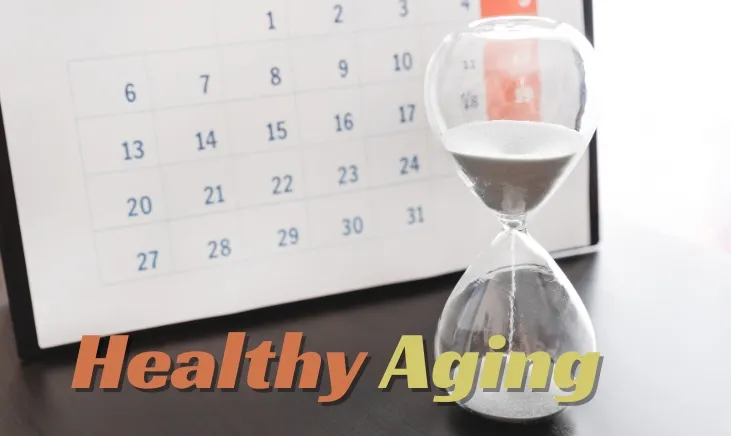
Versatile Food
Eggs add flavor and nutrients to many different recipes. They’re often associated with breakfast, but we can eat them at any meal!
Try a veggie and cheese omelet for breakfast, an egg salad sandwich for lunch, or an egg in your ramen soup for dinner.
Busting the Egg Cholesterol Myth
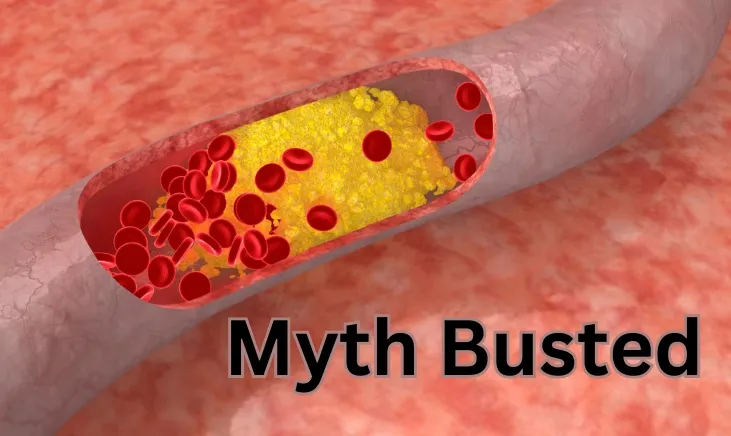
Individuals with a diagnosis or family history of heart disease may be more conscious of their blood cholesterol levels. Previous heart-healthy guidelines recommended eliminating dietary sources of cholesterol, which included eggs. However, what we now understand is that cholesterol-containing foods such as eggs don’t increase your risk of cardiovascular disease.
Cholesterol is made naturally in our body, and the amount that’s made is influenced by our genetics.
Factors that can affect your cholesterol and increase your risk of heart disease or stroke include:
- Alcohol consumption
- Physical inactivity
- Stress
- Lack of sleep
- Smoking and vaping
- High consumption of ultra-processed foods and saturated fats
What’s most important in terms of nutrition is focusing on a healthy dietary pattern.
For example, eating boiled eggs with bacon and deep-fried hash browns would be high in saturated fat and salt and not a heart-healthy meal.
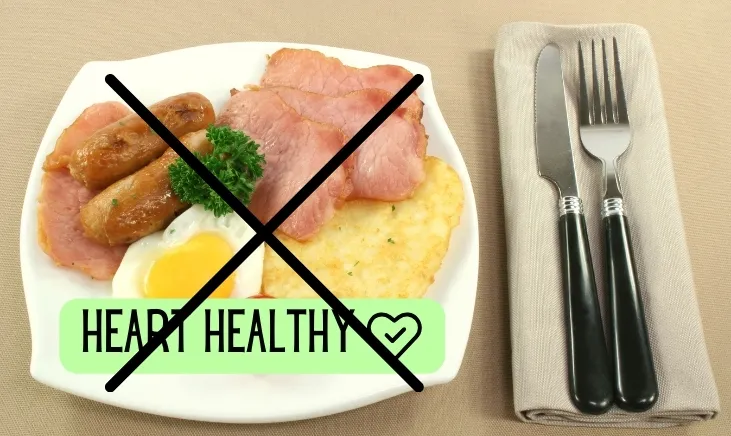
A better heart-healthy choice would be eating a boiled egg with sauteed vegetables and a side of oatmeal.
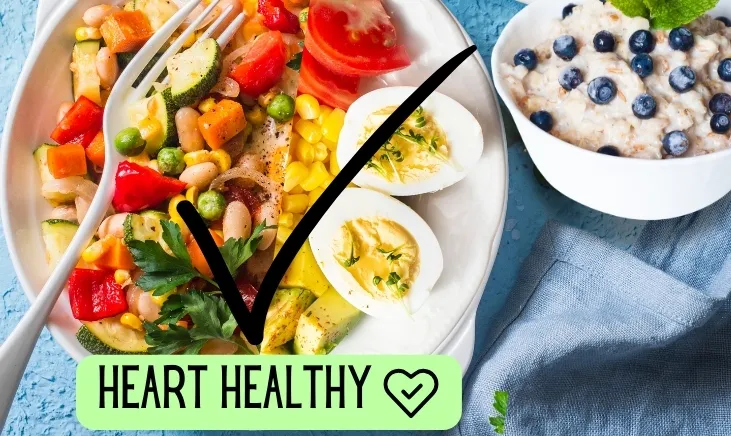
Key Takeaways:
- You can still eat eggs even if you’re watching your cholesterol levels.
- Eat eggs with other healthy foods like vegetables and grains rather than fried and processed foods.
Eating Boiled Eggs
Eat the Whole Egg: Egg Yolks and Whites
As discussed above, some nutrients are only found in the egg white and some only in the yolk.
| 1 Raw Egg Yolk (17 g) | 1 Raw Egg White (33 g) | |
|---|---|---|
| Energy (calories) | 56 | 17 |
| Protein (g) | 3 | 4 |
| Total Fat (g) | 5 | 0 |
| Calcium (mg) | 22 | 2 |
| Iron (mg) | 0.46 | 0.03 |
| Zinc (mg) | 0.39 | 0.01 |
| Riboflavin (mg) | 0.079 | 0.13 |
| Folate µg) | 24.8 | 1.32 |
| Choline (mg) | 139 | 0.36 |
| Vitamin B12 (µg) | 0.332 | 0.03 |
| Vitamin A (µg) | 64.8 | 0 |
| Lutein + Zeaxanthin (µg) | 185 | 0 |
| Vitamin E (mg) | 0.959 | 0 |
| Vitamin D (µg) | 0.918 | 0 |
| Saturated Fat (g) | 1.62 | 0 |
| Monounsaturated Fats (g) | 1.99 | 0 |
| Polyunsaturated Fats (g) | 0.714 | 0 |
| Cholesterol (mg) | 184 | 0 |
As a dietitian, I know that nutrition choices are very individual, and some people may choose to eat only egg whites or egg yolks. But, both the yolk and the white contain valuable nutrients that can benefit your overall health.
How Many Eggs Should Be Consumed In a Day?
Eggs can be a significant protein source while contributing only a moderate amount of calories.
Eating 2 boiled eggs every day would provide you with 10–30% of your vitamin requirements for the whole day!
Listen to your body and the hunger cues that it is giving you. Choosing a protein food at each meal is healthy, but be sure that you are also including whole grains, fruits, and vegetables.

Should You Buy Organic?
Different egg production systems include:
- Hens kept in cages
- In a barn floor or multi-tier system with no outside space
- Free-range where the hens are on a barn floor or multi-tier system with access to outside space

Organic eggs are eggs from hens housed in a free-range system, with specific guidelines set for the feed they receive, how many hens are in the space, and their veterinary treatments.
How the hen is housed and the food it receives may affect the egg’s nutrition. A review of the lutein and zeaxanthin concentration in yolks found that organic eggs had higher levels than free-range, barn, or caged eggs. This may be due to organic hens having greater access to leafy greens.
However, hens that live in a free-range environment also have a higher risk of contamination than caged.

Deciding to purchase caged, free-range, or organic eggs is completely up to you. Rest assured that all systems should follow guidelines to ensure that the eggs are safe to eat, and the differences in individual nutrients may not be significant. Pay attention to cost as well; if buying organic is going to break the bank, then it’s probably not worth it.
Key Takeaways:
- Cage, barn, and free-range systems refer to how the hens are housed and cared for.
- The nutrient profiles may change slightly between the systems.
- Consider your values and budget when choosing egg types.
Recipes
If you’re looking for some ways to add boiled eggs to your meal planning, take a look at the recipes at Eggs.ca
My favorite is: the Pesto Rice Bowl Topped With Soft Boiled Eggs
What About The Negatives?
- Eggs are a common allergen and cause symptoms such as coughing, rashes, or anaphylaxis in extreme cases for those with an egg protein allergy.
- Eggs are an animal-sourced protein and don’t fit into all dietary patterns. People who follow vegetarian or vegan diets and individuals following certain religious or cultural reasons may avoid eggs.
- Eggs can be associated with food-borne illnesses, such as salmonella contamination.
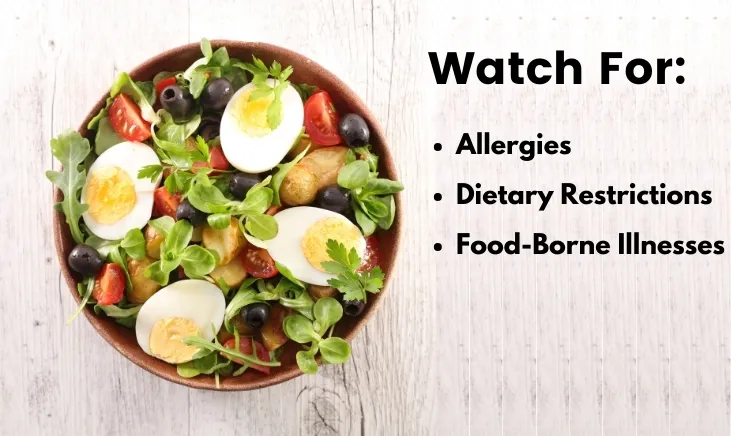
Are Boiled Eggs Good For You? Final Thoughts
Eggs can be included in a healthy dietary pattern. They are high in protein, important vitamins, and other bioactive compounds which maintain health and support development and aging.
As a dietitian, I would recommend boiled eggs to individuals looking to use whole foods to increase their daily nutrients or for those looking for quick, easy, and cheap nutritious foods.
Frequently Asked Questions
Are eggs healthy?
Eggs are a healthy food. Assuming you do not have an allergy to egg proteins, they are a safe and nutritious food with a variety of different nutrients that are important for health including protein, vitamins, and bioactive compounds.
Is it OK to eat boiled eggs every day?
Yes, you can eat eggs every day if you would like. The research now shows that there is no association between egg consumption and the risk of heart disease and that eating an egg every day will not increase your cholesterol.
Is 2 hard boiled eggs enough for breakfast?
Starting your day with a meal that is balanced in protein foods, fruits, veggies, and whole grains will set you up for success by keeping you full and providing the energy you need to start the day. Eating 2 boiled eggs would provide 143 calories and 12.4 grams of protein. Try your eggs with a piece of whole-grain toast and orange slices for a healthy breakfast!
Is cholesterol in eggs bad?
No, the cholesterol in eggs is not bad for you. Previous heart-healthy guidelines recommended eliminating dietary sources of cholesterol, which included eggs. However, what we now understand is that cholesterol-containing foods such as eggs don’t increase your risk of cardiovascular disease.














